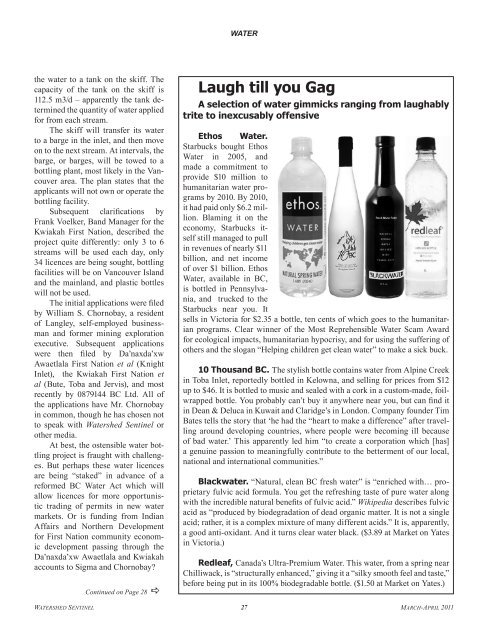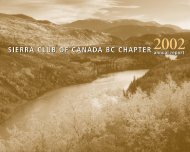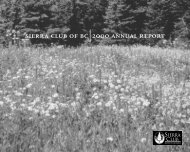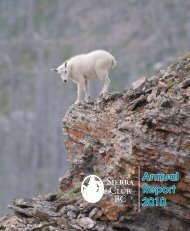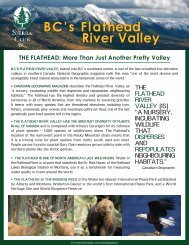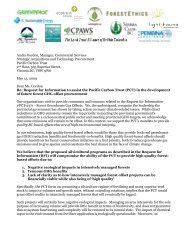Bogus Business? Bottling Bute - Sierra Club BC
Bogus Business? Bottling Bute - Sierra Club BC
Bogus Business? Bottling Bute - Sierra Club BC
Create successful ePaper yourself
Turn your PDF publications into a flip-book with our unique Google optimized e-Paper software.
WATER<br />
the water to a tank on the skiff. The<br />
capacity of the tank on the skiff is<br />
112.5 m3/d – apparently the tank determined<br />
the quantity of water applied<br />
for from each stream.<br />
The skiff will transfer its water<br />
to a barge in the inlet, and then move<br />
on to the next stream. At intervals, the<br />
barge, or barges, will be towed to a<br />
bottling plant, most likely in the Vancouver<br />
area. The plan states that the<br />
applicants will not own or operate the<br />
bottling facility.<br />
Subsequent clarifications by<br />
Frank Voelker, Band Manager for the<br />
Kwiakah First Nation, described the<br />
project quite differently: only 3 to 6<br />
streams will be used each day, only<br />
34 licences are being sought, bottling<br />
facilities will be on Vancouver Island<br />
and the mainland, and plastic bottles<br />
will not be used.<br />
The initial applications were filed<br />
by William S. Chornobay, a resident<br />
of Langley, self-employed businessman<br />
and former mining exploration<br />
executive. Subsequent applications<br />
were then filed by Da’naxda’xw<br />
Awaetlala First Nation et al (Knight<br />
Inlet), the Kwiakah First Nation et<br />
al (<strong>Bute</strong>, Toba and Jervis), and most<br />
recently by 0879144 <strong>BC</strong> Ltd. All of<br />
the applications have Mr. Chornobay<br />
in common, though he has chosen not<br />
to speak with Watershed Sentinel or<br />
other media.<br />
At best, the ostensible water bottling<br />
project is fraught with challenges.<br />
But perhaps these water licences<br />
are being “staked” in advance of a<br />
reformed <strong>BC</strong> Water Act which will<br />
allow licences for more opportunistic<br />
trading of permits in new water<br />
markets. Or is funding from Indian<br />
Affairs and Northern Development<br />
for First Nation community economic<br />
development passing through the<br />
Da’naxda’xw Awaetlala and Kwiakah<br />
accounts to Sigma and Chornobay<br />
Continued on Page 28 <br />
Laugh till you Gag<br />
A selection of water gimmicks ranging from laughably<br />
trite to inexcusably offensive<br />
Ethos Water.<br />
Starbucks bought Ethos<br />
Water in 2005, and<br />
made a commitment to<br />
provide $10 million to<br />
humanitarian water programs<br />
by 2010. By 2010,<br />
it had paid only $6.2 million.<br />
Blaming it on the<br />
economy, Starbucks itself<br />
still managed to pull<br />
in revenues of nearly $11<br />
billion, and net income<br />
of over $1 billion. Ethos<br />
Water, available in <strong>BC</strong>,<br />
is bottled in Pennsylvania,<br />
and trucked to the<br />
Starbucks near you. It<br />
sells in Victoria for $2.35 a bottle, ten cents of which goes to the humanitarian<br />
programs. Clear winner of the Most Reprehensible Water Scam Award<br />
for ecological impacts, humanitarian hypocrisy, and for using the suffering of<br />
others and the slogan “Helping children get clean water” to make a sick buck.<br />
10 Thousand <strong>BC</strong>. The stylish bottle contains water from Alpine Creek<br />
in Toba Inlet, reportedly bottled in Kelowna, and selling for prices from $12<br />
up to $46. It is bottled to music and sealed with a cork in a custom-made, foilwrapped<br />
bottle. You probably can’t buy it anywhere near you, but can find it<br />
in Dean & Deluca in Kuwait and Claridge’s in London. Company founder Tim<br />
Bates tells the story that ‘he had the “heart to make a difference” after travelling<br />
around developing countries, where people were becoming ill because<br />
of bad water.’ This apparently led him “to create a corporation which [has]<br />
a genuine passion to meaningfully contribute to the betterment of our local,<br />
national and international communities.”<br />
Blackwater. “Natural, clean <strong>BC</strong> fresh water” is “enriched with… proprietary<br />
fulvic acid formula. You get the refreshing taste of pure water along<br />
with the incredible natural benefits of fulvic acid.” Wikipedia describes fulvic<br />
acid as “produced by biodegradation of dead organic matter. It is not a single<br />
acid; rather, it is a complex mixture of many different acids.” It is, apparently,<br />
a good anti-oxidant. And it turns clear water black. ($3.89 at Market on Yates<br />
in Victoria.)<br />
Redleaf, Canada’s Ultra-Premium Water. This water, from a spring near<br />
Chilliwack, is “structurally enhanced,” giving it a “silky smooth feel and taste,”<br />
before being put in its 100% biodegradable bottle. ($1.50 at Market on Yates.)<br />
Watershed Sentinel 27<br />
March-April 2011


